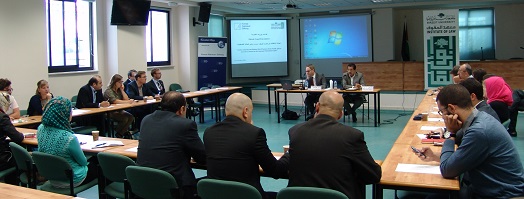Justice and Reconciliation Best Practices from South Africa: Lessons Learned to the Internal Palestinian Split
Presented by Mr. Jan Hofmeyr, Head of the Policy and Analysis Programme at the Institute for Justice and Reconciliation, South Africa, the event brought together a select number of members of the legal community, academics, and representatives of civil society organisations and international bodies.
Having welcomed the audience, Mr. Hofmeyr expressed his thanks and gratitude to the IoL for organising the legal encounter. He stated he was so privileged to be at the IoL and share the South African experience in materialising transitional justice. According to Mr. Hofmeyr, discussion should be reciprocal so that he could understand current conditions and challenges that the Palestinian society faces. To achieve transitional justice in any country, conditions of peace will be in place. Parties to the conflict need to reach an agreement. This is not the case in the Palestinian context, however. Peace has not been reached yet. We cannot talk about transitional justice in light of the continued conflict between the Palestinian and Israelis.
In South Africa, transition to democracy started in 1994. A democratic election was held for the first time. Because it was preceded by political tension, pogroms and assassinations, the electoral process was called a “miracle” election. A national unity government was established, including representatives of all political parties. At this time, a final constitution was also developed and approved. According to Mr. Hofmeyr, South Africans had to make transitional justice successful. The process addressed root causes of the conflict as well as history of racial discrimination in South Africa. In other words, South Africans had to reconcile with their past. To do so, the Truth and Reconciliation Commission (TRC) was established. However, it was so difficult to obtain documents that proved past crimes. The TRC had to implement certain measures, including pardon, whereby perpetrators were pardoned in return for information and documents that expose wrongdoings of the past era.
Mr. Hofmeyr addressed factors that facilitated a shift to transitional justice in South Africa. The international community played a crucial role in the transition to democracy. Having talked to many Palestinians, Mr. Hofmeyr said he felt that the majority of the Palestinian people no longer believe in the international community or role in the process of transition. For some time, this was the same feeling among the South African population, but . However, this sentiment changed thanks to liberation movements, which transmitted a message to the outside world about what was going in South Africa. After the Soviet Union had collapsed, the continued armed hostilities were so costly both morally and materially. Although it had not been so significant in years leading to the democratic transition, division affected parties to the conflict in South Africa. On the contrary, all political parties were in agreement. Members of the South African society showed due respect to the wise leadership of the country. The South African people was so lucky to have such a leadership. Both former Presidents Frederik W. de Klerk and Nelson Mandela were strong enough and capable of assessing the changing international context and continued the negotiation process.
The legal encounter was concluded by a set of recommendations. In the ensuing discussion, participants made several comments. Most importantly, due attention should be paid to transitional justice so that it changes into a continuing process. Transitional justice should not be a transient moment to be used under certain circumstances.
Speakers
1. Mr. Jan Hofmeyr
Venue
Institute of Law (IoL) at Birzeit University
Date
2014-10-16











